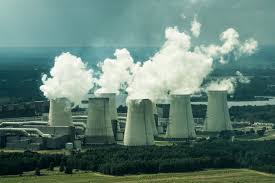來源于《社論》版塊
Coal and climate change
煤炭與氣候變化
Betting on black
押注煤炭 前途昏暗
Asian governments are the biggest supporters of the filthiest fuel
亞洲政府是最臟燃料的最大支持者
In the dense gloom about climate change, news of coal’s decline seems like a pinprick of hope. President Donald Trump may adore “beautiful, clean coal”, but even he cannot save it. A growing number of countries want to phase out coal entirely, a transition eased by cheap natural gas and the plunging cost of wind and solar power.
在氣候變化的陰霾中,煤炭產量下降的消息似乎是一絲希望。美國總統唐納德•特朗普或許崇尚“美麗、清潔的煤炭”,但即便是特朗普也無法拯救煤炭。越來越多的國家希望完全淘汰煤炭,廉價的天然氣和大幅下降的風能和太陽能發電成本緩和了過渡過程。
That is good news. Coal has been the largest engine of climate change to date, accounting for nearly a third of the rise in average temperatures since the Industrial Revolution. Any pressure on it therefore counts as progress.
這是個好消息。迄今為止,煤炭一直是氣候變化的最大引擎,在工業革命以來平均氣溫的上升中占了近三分之一。因此,對煤炭施加的任何壓力都被視為進步。

However, last year coal-fired electricity emitted more than ten gigatonnes of carbon dioxide for the first time, 30% of the world’s total. It may be in decline in the West, but many Asian governments continue to promote coal-fired power generation. They are making a dangerous bet.
然而,去年燃煤發電首次排放了超過100億噸的二氧化碳,占世界總量的30%。在西方,這一比例可能正在下降,但許多亞洲國家的政府仍在繼續推廣燃煤發電。他們在下一個危險的賭注。
Asia accounts for 75% of the world’s coal demand—China alone consumes half of it. The Chinese government has taken steps to limit pollution and support renewables. Yet coal consumption there rose in 2018, as it did the year before. In India coal demand grew by 9% last year. In Vietnam it swelled by almost a quarter. To keep the rise in global temperatures to no more than 1.5°C relative to pre-industrial times, climatologists insist that almost all coal plants must shut by 2050, which means starting to act now. Today’s trends would keep the last coal plant open until 2079, estimates UBS, a bank. Asia’s coal-fired power regiment has a sprightly average age of 15, compared with a creaky 40 years in America, close to retirement.
亞洲占世界煤炭需求的75%,僅中國就占了一半。中國政府已經采取措施限制污染,支持可再生能源。然而,與前2017年一樣,2018年中國的煤炭消費量有所上升。去年印度的煤炭需求增長了9%。在越南,這一數字增長了近四分之一。為了將全球氣溫相對于工業化前時期的上升幅度控制在1.5攝氏度以內,氣候學家堅持認為,到2050年,幾乎所有的燃煤電廠都必須關閉,這意味著現在就要開始行動。據瑞士聯合銀行估計,按照目前的趨勢,最后一家燃煤電廠將一直運營到2079年。亞洲燃煤電廠的平均運行年限是15年,而美國勉強維持40年,最后接近退休狀態。
譯文由可可原創,僅供學習交流使用,未經許可請勿轉載。












